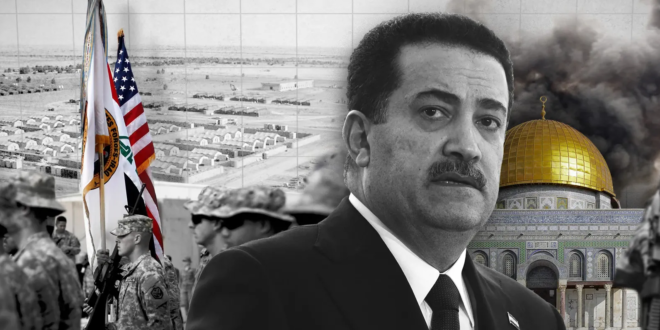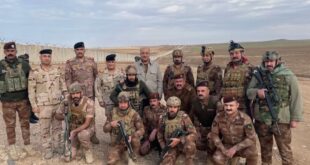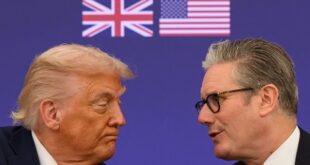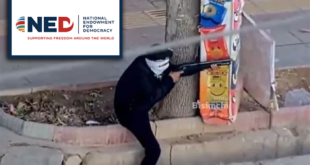As Israel crosses ‘red lines’ set by the Resistance, a neutral Baghdad is caught between Washington’s endorsement of the Gaza genocide and Iraqi resistance factions gunning for an American regional defeat.
The Yamamah Palace, the epicenter of Saudi Arabia’s royal authority in Riyadh, is known for its deliberate and measured decision-making, particularly in the face of significant regional events.
But Israel’s genocidal war against Gaza proved an exception, warranting a rapid dispatch of Foreign Minister Prince Faisal bin Farhan to Baghdad within a mere 48 hours after the Hamas-led resistance operation Al-Aqsa Flood was launched. This is far from a coincidence; a large subset of Iraqis belong to the regional Axis of Resistance.
Likewise, it is noteworthy that Iraqi Prime Minister Mohammed Shia al-Sudani revealed a discussion point that was visibly absent from the White House statement on his 16 October phone call with US President Joe Biden. Specifically, the part where the Iraqi leader expresses that “the continued aggression in Gaza stirs outrage among people in the region and globally.”
These two incidents lay bare Iraq’s state of confusion. The Persian Gulf state’s inner turmoil became even more evident in the way it voted on the Arab draft resolution presented by Jordan at the UN General Assembly.
War in West Asia
Although Baghdad had a hand in sponsoring the draft calling for a “sustained humanitarian truce,” the electronic vote initially showed that it had abstained. The Iraqi delegation in New York later scrambled to amend its vote in support of the resolution, blaming the mishap on “technical issues.”
Geographically, Baghdad may seem distant from occupied Palestine, but for many Iraqis and Palestinians, the legacy of Iraqi soldiers who helped prevent the Zionist occupation of Jenin in 1948 remains a powerful memory, with the cemetery of Iraqi martyrs standing as a solemn tribute.
However, Prime Minister Sudani faces challenges far more treacherous than reviving the heroic legacy of the Palestinian cause. Over the past week, at the Trebil border crossing with Jordan, large crowds of Iraqi protesters have camped out, and Iraqi oil shipments offered to Jordan at favorable prices are being hindered.
Chants of “Give me the fatwa, and see with your eyes” reflect the Iraqi street’s desire for a fatwa from the supreme Shia authority in Najaf, calling for defensive “jihad” against Israel. Sudani has also dealing with almost daily attacks on US military bases since 17 October.
While there are no “official” military fronts opened against Israel by the Arab states, the intensity of the political scene in Baghdad makes it almost impossible for Iraq to remain immune from the ripple effects of the “Unity of Fronts” that brings together the forces of the Axis of Resistance in Palestine, Lebanon, Syria, and Yemen.
The Resistance’s ‘red lines’
If Israel has shown little concern – at least so far – about the extent to which its brutal assault on Palestinians in the besieged Gaza Strip and the occupied West Bank affects the passive Arab governments near and far, it is the US that should actually be most anxious.
The relentless Israeli onslaught on Gaza, which has so far claimed over 8,000 civilian lives and left more than 20,000 people injured, poses a significant threat to one of the few accomplishments the US could still claim from its illegal 2003 invasion of Iraq. Back then, Washington boasted it was establishing a democratic system to replace an authoritarian Iraqi regime.
However, even the staunchest American ideologues who defended and justified the invasion are lost for words today, as the Gaza war undermines any noble goals attributed to their intervention. This genocide being committed in Gaza before the eyes of the world is eroding the last remnants of respect and prestige associated with the US.
Indeed, the urgent visit of Prince Faisal bin Farhan to Baghdad underscores Saudi awareness, traditionally aligned with US interests, of the sensitivity of the situation in Iraq. It signals a growing conviction that Iraq may not stay neutral in the ongoing conflict, especially now that Iranian President Ebrahim Raisi has announced that Israel has crossed certain “red lines” set by the Axis of Resistance.
These red lines include the much-delayed ground invasion of Gaza, an attempt to completely uproot Hamas and other Palestinian resistance factions, and the Israeli government stepping up its acts of aggression against other fronts.
Checking US moves
For Sudani, being Iraq’s prime minister without a solid party, parliamentary support, or political base to weather the looming regional war is a daunting challenge. Diplomatically, Baghdad is also in an uneasy position.
Incidents such as the one at the UN, where Iraq supported a ceasefire resolution but balked over references to the defunct “two-state solution” – given Iraqi legal stances against normalization with Israel – and concerns about placing Palestinian civilians on the same footing as their occupying overlords.
Sudani’s biggest fear is being pulled into Iraq’s messy domestic politics over this issue. Observers believe that the “Coordination Framework” forces, which played a pivotal role in bringing him to power, won’t stand idle if the US allows Israeli President Benjamin Netanyahu to bring about another nakba.
Among these Framework forces, there are Iraqi factions that align themselves with the Resistance Axis, maintain close ties with Iran and Lebanese Hezbollah, and consider the Palestinian cause a central issue in their political discourse.
Hadi al-Amiri, leader of the Badr Organization, was among the first to escalate the rhetoric a day after Washington announced it would ramp up arms supplies to Israel, warning that: “If they intervene, we would intervene…if the Americans intervened openly in this conflict…we will consider all American targets legitimate … and we will not hesitate to target it.”
Three weeks into the current conflict, the extent of US involvement becomes clearer, including implicit and overt threats to prevent any regional party from intervening against US and Israeli interests. Calls and letters from western leaders to Baghdad have also been on the rise.
Jaafar al-Husseini, spokesman for the prominent Iraqi resistance faction Kataib Hezbollah, said that “the resistance in Iraq achieved its first attacks … and will continue at a higher pace,” adding that “The Americans are essential partners in killing the people of Gaza and therefore they must bear the consequences.”
US Proxy or Protector of Palestine?
The west, particularly the US, is employing intimidation tactics through messages conveyed to Baghdad. They are trying to push the Sudani government to act as their proxy within the “containment front,” which will potentially spark internal conflict.
This would jeopardize the relative calm that marked the first year of Sudani’s premiership. It will further undermine efforts to promote Iraq’s regional integration and distance it from Iran in exchange for closer ties with Arab states like Egypt, Jordan, Saudi Arabia, and the UAE.
Iraqi sources say that the status-of-forces agreement known as “SOFA” between Baghdad and Washington may be one of the first “victims” of the Israeli escalation in Gaza and the destabilizing US military involvement in the war.
If Iraqis cancel the agreement regulating US military presence in their country, it would render the US mission and presence illegitimate, effectively pushing Iraq out of the Atlanticist orbit two decades after the invasion.
Another potential casualty of Al-Aqsa Flood is the third Baghdad Conference backed by Paris – Its convening is now in doubt, especially if the region becomes further inflamed. This would be a setback for France’s influence and its role in Iraq, including a lucrative deal worth over $27 billion with French conglomerate Total Energy.
The “hands on the trigger,” as the Iranians have stressed repeatedly, are not just a threat but also a form of pressure to compel the US to rein in the Israeli government’s genocidal actions. Baghdad has conveyed a message from Washington to Tehran that calm is needed, and the Iraqis have also relayed to the Americans the importance of not provoking Lebanese Hezbollah if the US truly wants to contain the situation regionally.
The real question here isn’t whether Iraqi factions will engage in a major war, but whether Washington is so beholden to Israel that it will overlook the potential repercussions of the growing outrage within Iraq and the rest of West Asia, which will eventually engulf the US’s remaining overt colonial outpost in the region.
 Eurasia Press & News
Eurasia Press & News



